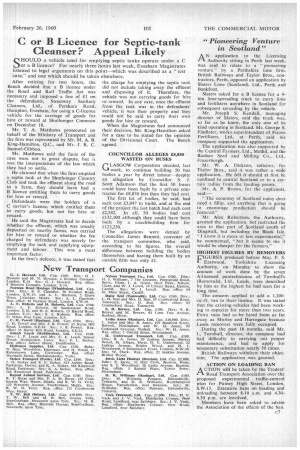C or B Licence for Septic-tank Cleanser? Appeal Likely S HOULD
Page 153

If you've noticed an error in this article please click here to report it so we can fix it.
a vehicle used for emptying septic tanks operate under a C or a B licence? For nearly three hours last week, Evesham Magistrates listened to legal arguments on this point—which was described as a "test case," and one which should be taken elsewhere.
After retiring for two hours, the Bench decided that a B licence under the Road and Rail Traffic Act was necessary and imposed a fine of £1 oil the defendants, Sweetway Sanitary Cleaners, Ltd., of Pershore Road, Hampton, Evesham, for using a C-licence vehicle for the carriage of goods for hire or reward at Shuthonger Common on December 18..
Mr. T. A. Matthews prosecuted on behalf of the Ministry of Transport and the firm was represented by Mr. M. A. B. King-Hamilton, Q.C., and Mr. J. R. C. Samuel-Gibbon.
Mr. Matthews said the facts of the case were not in great dispute, but ii was the interpretation of the law which they had to settle.
He claimed that when the firm emptied a septic tank at the Shuthonger Country Club and took the effluent along the road to a farm, they should have had a B licence entitling them to carry goods for hire or reward.
Defendants were the holders of a C carrier's licence, which entitled them to carry goods, but not for hire or reward.
He said the Magistrates had to decide whether the effluent, which was usually deposited on nearby farms, was carried for hire or reward or whether the fee charged by defendants was merely for emptying the tank and supplying equipMeat and labour. This was a most important factor.
In the firm's defence, it was stated that the charge for emptying the septic tank did not include taking away the effluent and disposing of it. Therefore, the vehicle was not carrying goods for hire or reward. In any case, once the effluent from the tank was in the defendants' vehicle, it was their property and they could not be said to carry their own goods for hire or reward.
When the Magistrates had announced their decision, Mr. King-Hamilton asked for a case to be stated for the opinion of the Divisional Court. The Bench agreed..
COUNCILLOR ALLEGES 18,850 WASTED ON BUSES
GLASGOW Corporation decided, last week, to continue building 50 bus bodies a year by direct labour—despite an allegation by Councillor S. J. Scott Adamson that the first 50 buses could have been built by a private contractor for £8,850 less than they had cost.
The first lot of bodies, he said, had each cost £3,047 to build, and at the end of the project the last batch had each cost £2,542. . In all, 50 bodies had cost £132,100 although they could have been built by a coachbuilding firm for £123,250.
The allegations were denied by Councillor James Bennett, convener of the, transport committee, who said, according to his figures, the overall difference between building the bodies themselves and having them built by an outside firm was only El.
























































































































































































































